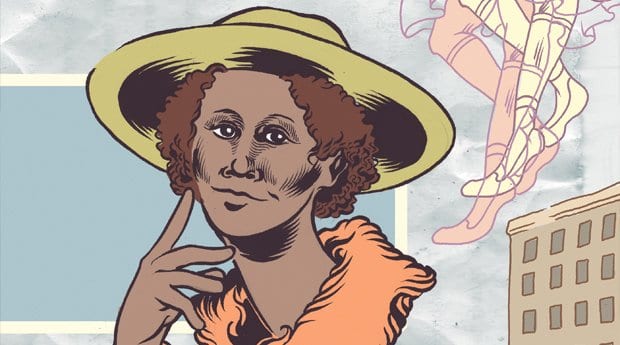The gay community has a disturbing habit of erasing its own history; actually, a more appropriate metaphor would be the generous use of Wite-Out. Despite the contributions of non-white people from all walks of life, the gay rights movement has long been depicted as deceptively white. Photos of the Mattachine Society (gay men) and the Daughters of Bilitis (lesbians), pre-Stonewall organizations considered early gay rights organizations, show lineups of (undeniably brave) white people. Even the banner image for the current Lesbian Herstory Archives website, founded in 1974 to discuss sexism in another group, the Gay Academic Union, depicts a congregation of white women. This, despite the fact that a vital supporter and donor to the archives was a proud African-American community member and black lesbian activist named Mabel Hampton.
Hampton was born in May 1902 to Lulu Hampton, who died of poisoning two months after her daughter was born. Hampton spoke about an idyllic childhood, raised by her maternal grandmother on a farm in North Carolina. When her grandmother died of a stroke when Hampton was seven, she went to live with her aunt and uncle in New York City.
Her uncle, a minister, treated her cruelly, physically abusing and raping her, and after less than a year she ran away to New Jersey. There she was taken in by a kind white family, whose surname was White.
At 17, Hampton was wrongfully charged with prostitution (“I hadn’t been with a man no time”) and spent three years in the Bedford Hills reformatory for women. She was released early on the condition that she stay out of New York, but the temptations of the city’s nightlife, and a girlfriend she’d met in Bedford, eventually led to a neighbour ratting on her indiscretions, forcing her back to the reformatory to serve the remainder of her sentence.
Once out of prison, she worked as a cleaner for white families by day and danced in a women’s troupe in all-black theatres by night. She continued doing cleaning work before getting permanent jobs later in life but didn’t stay in show business for long. Asked why, she said, “I like to eat.”
Hampton lived openly as a lesbian long before the term was widely used. She partied with other lesbians, bringing along girlfriends both white and black. In 1932, she met Lillian Foster, a black woman originally from Virginia, and they became as good as married. During a spat, Hampton referred to Foster as “Little Bear”; Hampton was short and Foster shorter, so this became an affectionate nickname, with Hampton matched as “Big Bear.”
Early in their relationship, Hampton was often away for extended periods searching for work. “Everything is OK at home. Only I miss you so much, I will be glad when this time is up. There is nobody like you to me,” Foster once wrote. They were together 46 years until Foster’s death from heart failure in 1978.
Hampton was a patron of the arts and supporter of many charities, including the Martin Luther King Jr Memorial Foundation and many gay and lesbian organizations. She also kept her own archives, including everything from playbills to news clippings. While working in the housekeeping division of Jacobi Hospital (where some co-workers called her “Captain”), she met the pioneering transsexual Christine Jorgensen; Hampton’s archives include a famous 1952 Daily News article about Jorgensen, “Ex-GI Becomes Blonde Beauty.”
Hampton marched at the first demonstration for gay rights in Washington in 1979 and in every single NYC Pride parade that occurred during her lifetime. When she could no longer walk the whole parade, other lesbians fought for the honour to push her wheelchair down Fifth Avenue. Hampton always marched under the Lesbian Herstory Archives (LHA) banner. Joan Nestle, one of the founders of the LHA, a writer, biographer and close friend of Hampton’s, wanted her story known and made sure it was never erased.
Nestle remembers Hampton as a woman of integrity who was dedicated to creating community and a life of freedom. As Hampton said at the New York Pride rally in 1984, a few years before her death, “I, Mabel Hampton, have been a lesbian all my life, for 82 years, and I am proud of myself and my people. I would like all my people to be free in this country and all over the world, my gay people and my black people.”
For more on Hampton, see Joan Nestle’s essay “I Lift My Eyes to the Hill: The Life of Mabel Hampton as Told by a White Woman.”


 Why you can trust Xtra
Why you can trust Xtra


